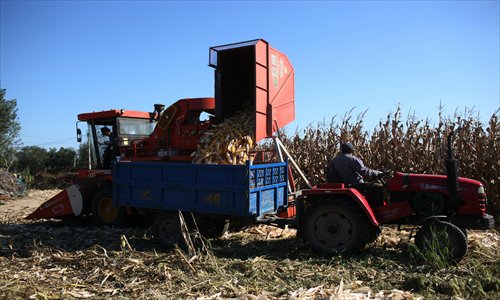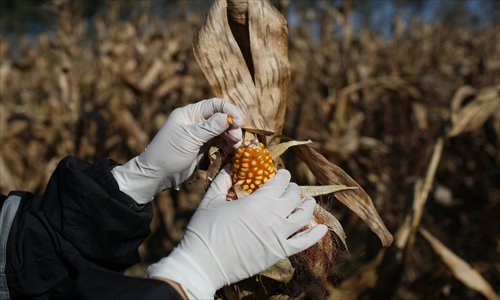HOME >> CHINA
Northeast authorities vow they will work to eradicate GM grains
Source:chinatimes.cc - Global Times Published: 2016-2-1 20:13:03


Farmers in the city of Xinmin, Northeast China's Liaoning Province harvest corn on October 13, 2015. Photos: Ma Longlong/Greenpeace
The announcements came after news outlets disclosed that GM corn were being grown in Northeast China last year. Jilin Province has since revoked three companies' seed production licenses.
At present, China only allows the commercial cultivation of genetically modified cotton and papaya.
A document released on January 27 by the central government on agriculture pledged to strengthen GM research and supervision.
Han Jun, deputy head of the office for the central leading group on agricultural work, said at a news briefing that local authorities have to prevent GM seeds from entering the market without examination or approval.
Stalking offenders
A notice issued on GM corn seeds by Jilin's Shuangliao agricultural law enforcement team said that the authorities have "zero tolerance" for illegal GM seeds and reiterated that all kinds of GM corn are banned from entering the market.
Meanwhile, Liaoning Province's seeds administration issued a letter on January 19 to seed enterprises and farmers informing them that GM crops are not allowed, and individuals and companies suspected of dealing in illegal seeds will be punished and may even face criminal charges.
Large quantities of GM corn were found being grown illegally in Liaoning, much of which has already entered grain storage warehouses and wholesale and retail markets across the country, according to a report released by the environmental NGO Greenpeace in early January.
In response to the report, the Liaoning agricultural authorities said they would look into the case, but have not yet released any investigation results.
"Only some small companies in Northeast China dealt with illegal GM seeds which were deliberately sent to them by some transnational corporations," a senior seed industry insider was quoted as saying.
Nong'an county agricultural law enforcement team in Jilin warned farmers that some companies have exaggerated potential yields to lure farmers into buying unauthorized seeds.
A Liaoning farmer told chinatimes.cc that he heard that most insect resistant corn seeds are genetically modified, and some farmers have been planting them for years.
But the seeds industry insider said that some of those seeds advertised by seeds agencies cannot resist insects, and are not GM seeds.
The Xinjiang Uyghur Autonomous region, Gansu and Hainan provinces are the main seed production bases in China. Boosting control in these regions is crucial to preventing the spread of GM seeds. Previously, illegal GM seeds were found in Hainan, according to chinatimes.cc.
Trivialize investigations
The insider told the website that China has not commercialized GM seeds in part due to multinational seed companies' monopoly on patents, which cover thousands of products including herbicide- and insect-resistant genes.
Those companies could charge fees if China lifted the ban on the commercialization of GM, the insider said.
According to Southern Weekly, as early as 2005, illegal trading in GM rice was found in Hubei and Hunan provinces. The agricultural departments have conducted several investigations into the sale of GM seeds since 2010, but seldom published the results.
Tong Pingya, a research fellow at the Chinese Academy of Agricultural Sciences, told Southern Weekly in 2011 that the authorities tried to trivialize the investigations as agricultural officials and seed companies have formed a benefit chain in some places.
Authorities have not issued any official reports on how much GM corn was found in Northeast China and how it was introduced to the region. But most farmers in the region have already purchased seeds for this spring. Several farmers told chinatimes.cc that they do not know what they will do if the country's grain reserve refuses to collect their crops if they find some of them are GM.
Newspaper headline: Corn crackdown
Posted in: Society